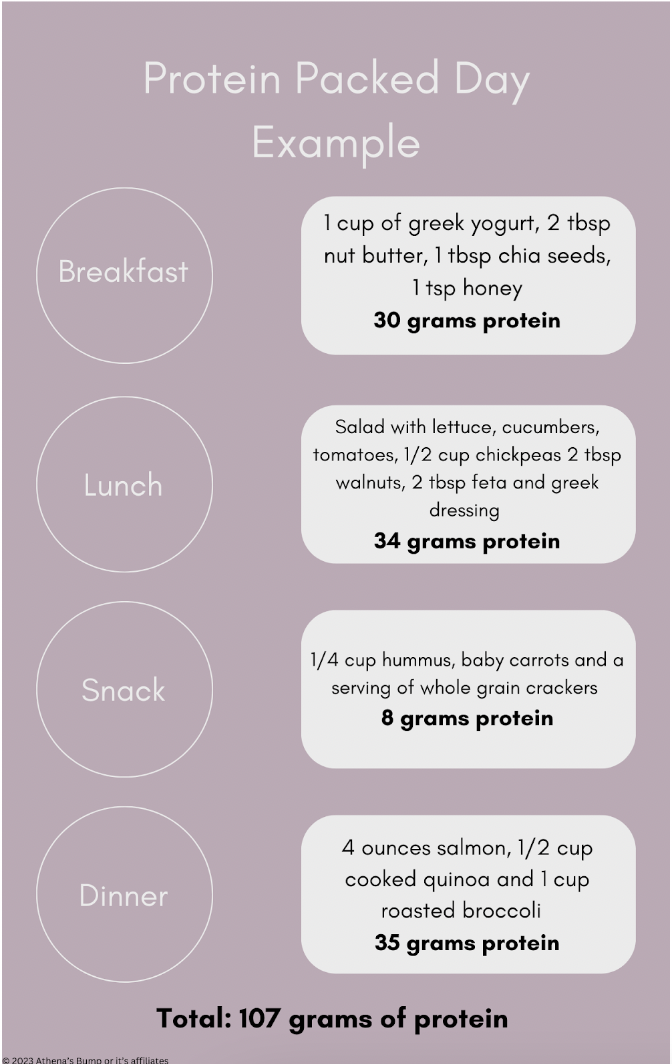Protein and Pregnancy To Nourish Your Baby
When getting ready for a new baby, there are a lot of things you must buy and prepare. You’ve probably started looking at cribs, strollers, baby clothes and decorating a room for your little one. While all of these preparations happen at different times throughout pregnancy, it’s never too early to add good nutrition to your to-do list to help nourish yourself and your baby.
Obtaining adequate protein each day is essential for a flourishing pregnancy. It may sound like a lot on top of the other things you need to do, but in this article we will talk about the role of protein in your pregnancy and give you some guidance on how to meet your protein goals.
How much Protein?
Protein intake during pregnancy is of utmost importance for both the health of the expectant mother and the optimal development of the growing fetus. One study found that protein needs may be as high as 1.22 grams per kilogram in the first part of pregnancy and 1.52 later in pregnancy. According to this study, a pregnant person weighing 140 lb. or 64 kg pre-pregnancy, would be eating 78-97 grams of protein compared to the guidelines of eating 1.1 grams per kilogram or 70 grams of protein.
When thinking about eating protein, especially over 70 grams a day, it may lead us to picture copious servings of chicken, steak or increased protein powder serving. However, there are a large variety of options for obtaining protein other than animal products. You can find plenty of protein in legumes, seeds, nuts, whole grains, vegetables or tempeh and tofu.
Before we get further into what foods to include let’s dive deeper into the question of the day: Why is protein so important for pregnant people?
Why Protein?
Proteins, more specifically amino acids (the building blocks of proteins) are crucial for various physiological processes in the body and play a vital role in the formation of tissues, organs, enzymes, hormones and antibodies. Let’s talk about several key reasons why protein intake is significant during pregnancy:
Fetal Growth and Development:
Amino acids provide the essential building blocks for the growth and development of the fetus. They are needed for the formation of baby's organs, muscles, bones and tissues.
Increased Blood Volume:
During pregnancy, the mother's blood volume increases to meet the demands of the growing fetus. Protein is necessary to produce red blood cells and hemoglobin, which help transport oxygen to the baby and help prevent anemia in the mother.
Placenta Development:
The placenta is responsible for supplying oxygen and nutrients to the fetus. Proteins are essential for the development and functioning of the placenta, ensuring proper nutrient transfer and a healthy pregnancy.
Maternal Tissue Repair:
Pregnancy puts significant strain on the mother's body, including the expansion of the uterus, breast development, and increased blood supply. Adequate protein intake supports tissue repair and regeneration in the mother's body.
Hormone and Enzyme Production:
Amino acids are involved in the production of hormones and enzymes that regulate various processes in both the mother and the fetus. This includes the hormone insulin, which helps regulate blood sugar levels.
Satiety and Blood Sugar Balance:
A sufficient amount of protein during meals and snacks can help you feel fuller for a longer period of time. Higher protein foods take longer to digest.
When carbohydrate rich foods are paired with protein foods, this helps to balance blood sugar by slowing the absorption of carbohydrates.
Preserve Muscle Mass:
Pregnancy is a time for building and nourishing. Consuming an adequate amount of protein ensures that the body is able to properly use its energy to support the growth and development of the baby.
When the body does not get enough protein or calories in general, it starts to break down fat and eventually muscle for fuel. This is hard on the mother’s body and leaves little extra to nourish the growing baby.
Immune System Support:
Protein intake is essential for the development and functioning of the immune system, helping to protect both the mother and the fetus from infections and diseases.
Eat Food, Not Numbers
It is recommended that pregnant people consume approximately 75 to 110 grams of protein per day, depending on their individual needs. The amount of protein a pregnant individual will need depends on a wide variety of factors such as body weight, age and activity level.
We eat food, not numbers.
Having a general idea of how much protein different foods contain can help when meal planning. The most important things to remember are balance and variety. Try eating a mix of plant and animal foods or eating a mix of plant based foods with a variety of protein sources. Also, space your protein intake throughout your day. The body can only handle so much protein in one sitting.
This list can help you gauge how much protein rich foods to include each day.
This is an example of a day of eating with a sufficient amount of protein. Meals do not have to be complicated. Eating enough protein can be done easily with just a little bit of planning. Check out athenasbump.com or delicious and nourishing recipe ideas! Log in to find the perfect protein-rich recipe for any part of your pregnancy.
References
Herring CM, Bazer FW, Johnson GA, Wu G. Impacts of maternal dietary protein intake on fetal survival, growth, and development. Exp Biol Med (Maywood). 2018 Mar;243(6):525-533. doi: 10.1177/1535370218758275. Epub 2018 Feb 22. PMID: 29466875; PMCID: PMC5882021.
Institute of Medicine (US) Committee on Nutritional Status During Pregnancy and Lactation. Nutrition During Pregnancy: Part I Weight Gain: Part II Nutrient Supplements. Washington (DC): National Academies Press (US); 1990. 19, Protein and Amino Acids. Available from: https://www.ncbi.nlm.nih.gov/books/NBK235221/
Protein and amino acids - nutrition during pregnancy - NCBI bookshelf. (n.d.). https://www.ncbi.nlm.nih.gov/books/NBK235221/
Stephens TV;Payne M;Ball RO;Pencharz PB;Elango R; (2014, September 24). Protein requirements of healthy pregnant women during early and late gestation are higher than current recommendations. The Journal of nutrition. https://pubmed.ncbi.nlm.nih.gov/25527661/




